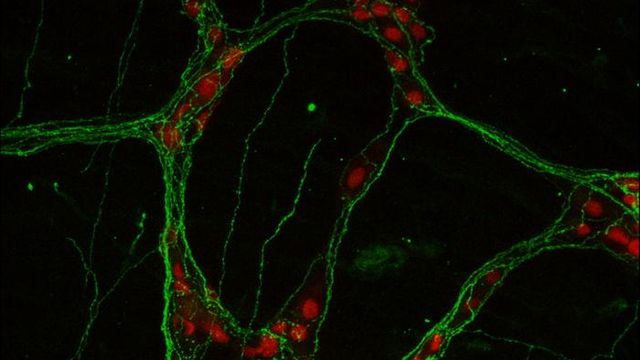Gut Neurons Key To Controlling Inflammation in IBD

Thank you. Listen to this article using the player above. ✖
Want to listen to this article for FREE?
Complete the form below to unlock access to ALL audio articles.
Neurons in the gut produce a molecule that helps regulate immune responses during and after intestinal inflammation, according to a new study by researchers at Weill Cornell Medicine. The findings, published in Nature Immunology on August 15, suggest that this neuro-immune communication may influence the progression and resolution of inflammatory bowel disease (IBD).
The gut’s enteric nervous system, sometimes referred to as the “second brain,” contains hundreds of millions of neurons that coordinate essential functions including digestion, blood flow and nutrient uptake. Although its role in regulating gut physiology is well-established, how this system contributes to immune regulation during inflammation has been less well understood.
“The enteric nervous system has long been neglected when thinking of how we can resolve detrimental intestinal inflammation.”
Dr. Jazib Uddin.
Key immune cells depend on a neuronal signal
The study focused on a type of immune cell called group 2 innate lymphoid cells (ILC2s), which are found in the gut lining. ILC2s are known to produce amphiregulin, a growth factor involved in tissue repair. Previous research showed that ILC2s can respond to signals from the nervous system. In the current study, the researchers identified one such signal – a molecule called adrenomedullin 2 (ADM2), produced by enteric neurons – as essential for maintaining ILC2 function during inflammation.
Using a mouse model of IBD, the team found that increasing ADM2 levels expanded ILC2 populations and improved outcomes during intestinal inflammation. In contrast, loss of ADM2 signaling reduced the number of these cells and worsened disease symptoms, suggesting that the molecule plays a protective role during gut injury.
Evidence extends to human tissues
To assess whether these findings apply to humans, the team examined tissue and blood samples from the Jill Roberts Institute for Research in Inflammatory Bowel Disease Live Cell Bank. In individuals with IBD, expression of ADM2 was found to be higher than in healthy controls. Further experiments showed that ADM2 stimulation promoted amphiregulin production in human ILC2s, supporting the conclusion that this signaling pathway also operates in the human gut.
The findings point to a neuro-immune axis in the gut that could be therapeutically targeted to support tissue healing in IBD and related disorders. The researchers suggest that modulating ADM2 levels or mimicking its effects might one day help restore immune balance and reduce inflammation in affected individuals.
Reference: Uddin J, Yano H, Parkhurst CN, et al. CGRP-related neuropeptide adrenomedullin 2 promotes tissue-protective ILC2 responses and limits intestinal inflammation. Nat Immunol. 2025. doi: 10.1038/s41590-025-02243-2
This article has been republished from the following materials. Note: material may have been edited for length and content. For further information, please contact the cited source. Our press release publishing policy can be accessed here.
This content includes text that has been generated with the assistance of AI. Technology Networks’ AI policy can be found here.
link






